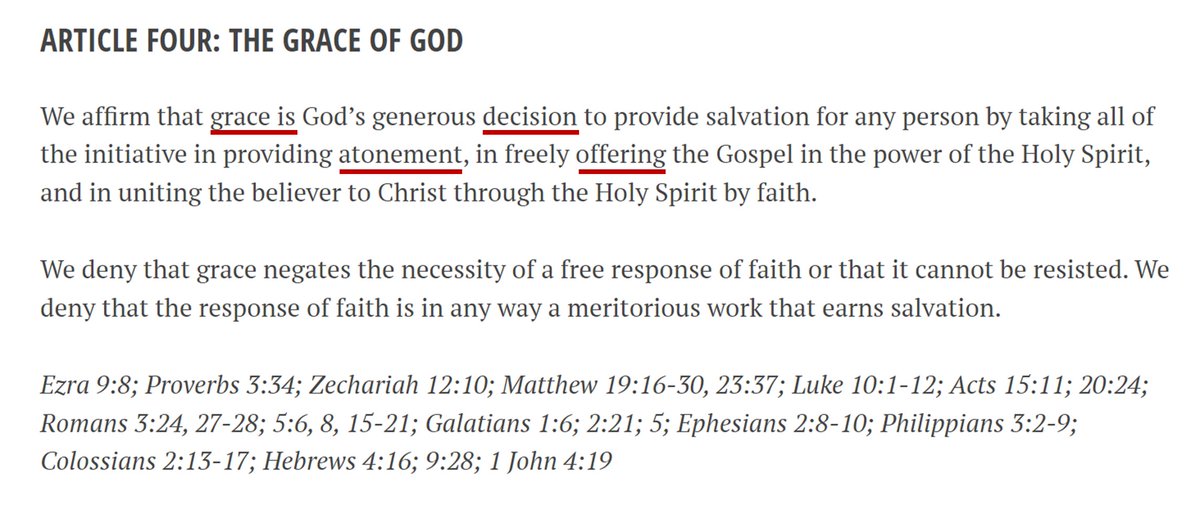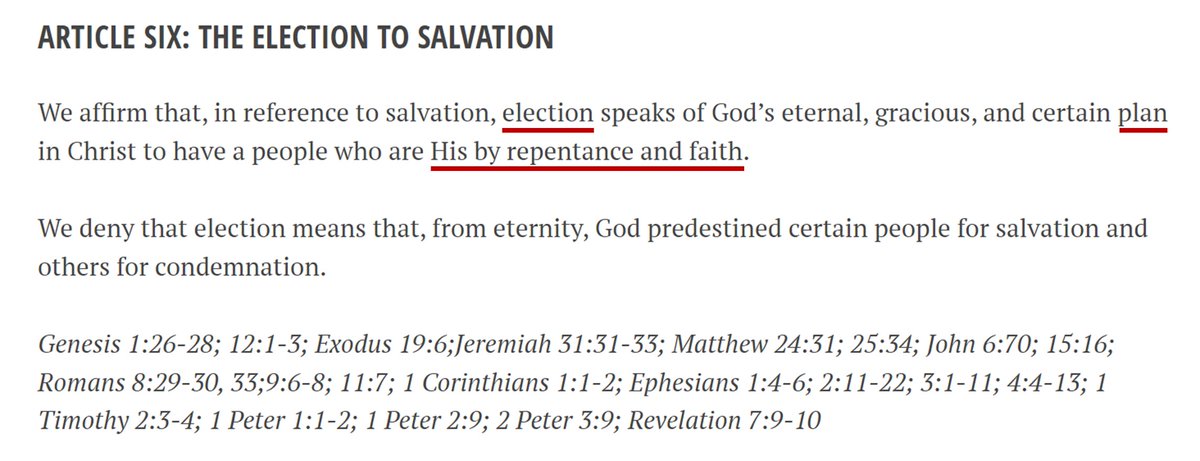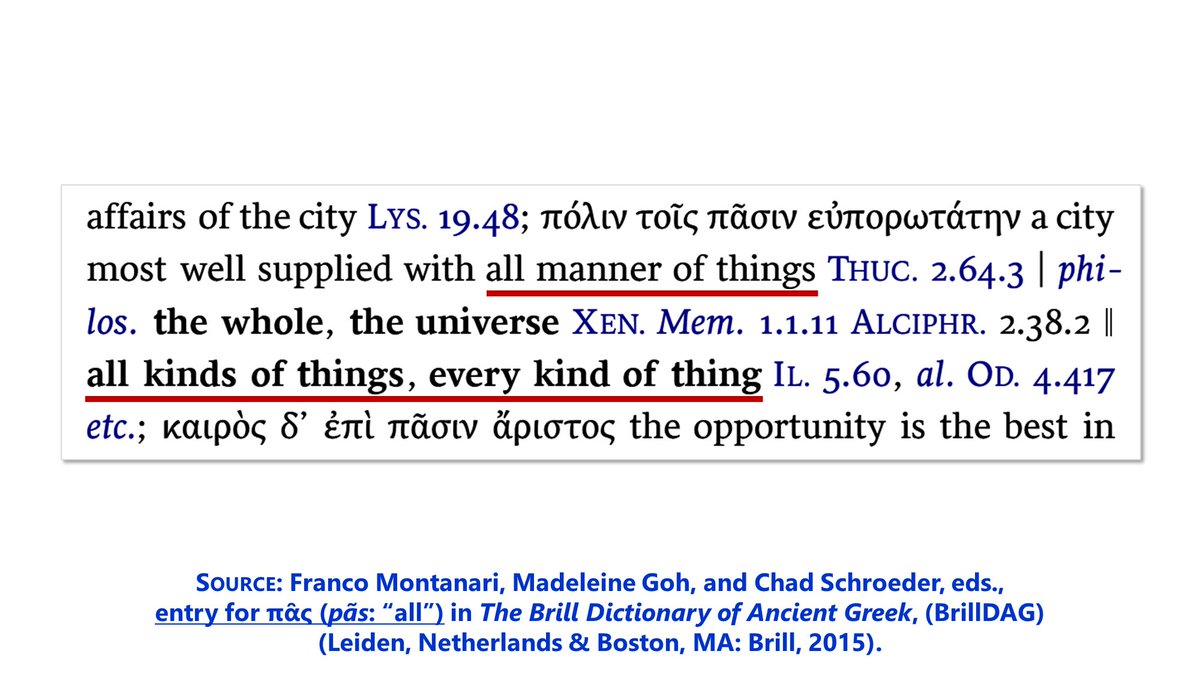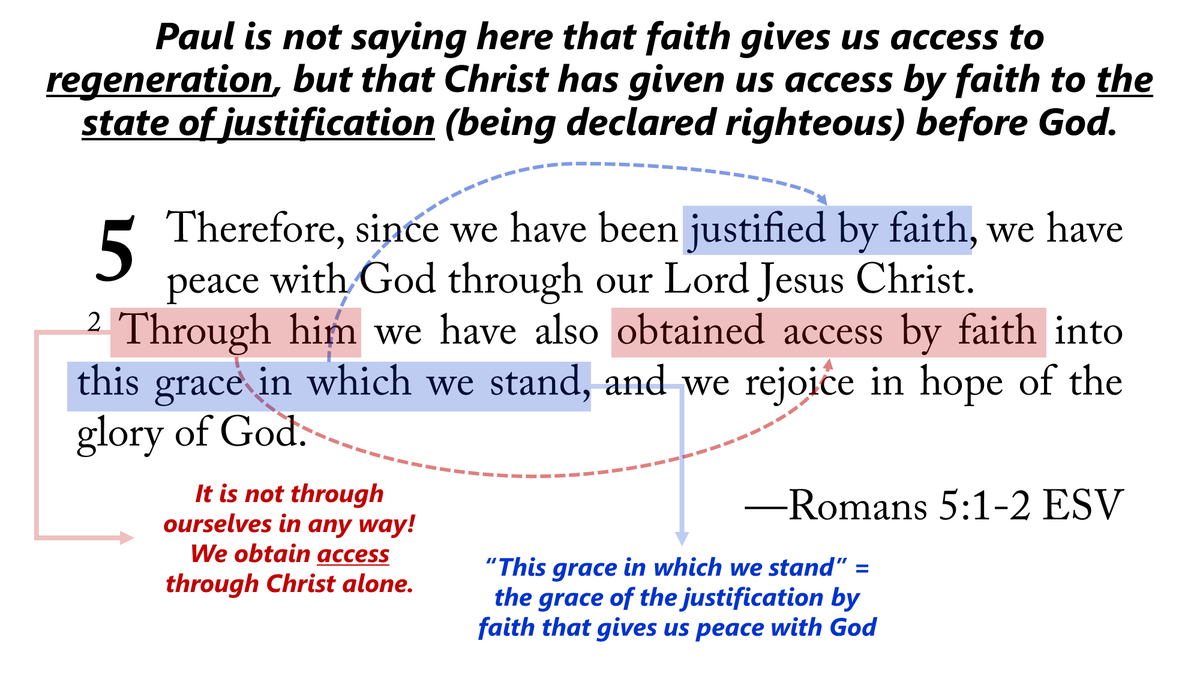🧵Wherein I reply to someone questioning my honesty for saying that, in Provisionism, God’s love and grace are insufficient reasons for Him to choose (i.e., elect) to save sinners since He also requires something in the sinners (i.e., faith)—with additional notes on definitions.

Well, @Duke456521, since all my remarks here echo Provisionism’s actual statements, including what’s written in its official statement of faith, “What is Provisionism?” I could just as easily question your honesty, couldn’t I? 

But why should both of us muck around in ad hominems when we have clear texts to examine?
Earlier you wrote, “He chose to save us because he loves us,” and now you write, “Salvation is grounded in God’s grace.” Those are both excellent statements.
Earlier you wrote, “He chose to save us because he loves us,” and now you write, “Salvation is grounded in God’s grace.” Those are both excellent statements.
Since a “ground” is defined as “a basis for belief, action, or argument” (Merriam-Webster), we can say from what you wrote that God’s choice (election) to save us is grounded in (based on) His love for us while His actual saving of us is grounded in (based on) His grace.
The point I made that led you to question my honesty is that the answer to (a) is “there are additional grounds,” namely, faith, and the answer to (b) is “yes, this undermines love and grace as being the basis for His choice (election) to save us.”
If something we provide is necessary for God to choose us, that thing is not only one of the grounds of His choice, but it renders the other grounds (namely, His love and grace) insufficient reasons for Him to choose us. I don’t understand why any Provisionist would deny this.
The word “reason” is synonymous with “ground” and “basis.” And in Provisionism, the necessary reasons why (i.e., grounds or bases on which) God saves sinners include God’s love and grace, but also include the sinner’s faith. All three are necessary.
This makes the first two insufficient without the third. So, it’s not only misleading but flat-out wrong to say, “The reason God saves those who believe is because he loves us. His love is the reason, not our belief.” In Provisionism, it’s not an “either/or;” it’s a “both/and.”

What you’re essentially saying here is that God’s saving love is limited to believers. However much he may love all sinners, He doesn’t love all of them enough to save them. His saving love is only given in exchange for faith.
So, since God only savingly loves sinners to the degree He saves them, in Provisionism it boils down to something in them: their faith. It’s hard to see how this is supposed to be better than Calvinism. Ultimately, He still doesn’t savingly love all sinners equally in your view.
Now, in Calvinism, God only loves the elect to the degree that He saves them. There’s a biblical reason for that: By their very nature, totally depraved sinners culpably blind and deafen themselves, making themselves unable to respond in faith to the free offer of the Gospel.
The Total Inability of unregenerate sinners is a stubborn, self-induced inability caused by their full intentionality to unrighteously suppress the truth they’re plainly shown (Ro 1:18-19). They can’t believe because they won’t believe.
In both systems, God’s saving love is limited. In Provisionism, it’s limited to those with something in themselves, viz., faith. In that system, salvation comes from God’s grace plus sinners’ faith.
In Calvinism, it’s limited to those who, despite the fact they nothing in themselves, have been sovereignly chosen solely by God’s grace plus nothing, because God Himself supplies the faith He requires from helpless sinners.
But the problems between us are not limited to logic. They also include language. Much of the confusion that occurs in debates between Provisionists and Calvinists is due to the fact that our words don’t really mean the same things.
Upon inspection of the “What is Provisionism?” page on the Soteriology 101 website, it appears that we don’t have the same definitions of “love” and “grace,” let alone “election.”
That page’s 10 articles in large part serve to define its terms. But, oddly enough, not only does it not define “love,” the word “love” is nowhere to be found on the page.
And yet we really can’t understand the biblical doctrines of God’s grace and election until we first grasp the biblical doctrine of His love.
I’d think that at least including “love” in, say, its article on the Gospel, the atonement, or grace would be helpful. What does it say about Provisionism that its statement of faith doesn’t even have the word?
We’re left to assemble our impression of Provisionism’s definition of “love,” particularly “God’s love,” from statements scattered elsewhere. And that impression confirms what I wrote above: It doesn’t view God’s love as a completely sufficient motive for Him to save anyone.
It’s fair to say that in Provisionism, God’s grace is rooted in His love, but even His love and grace taken together still require the addition of the sinner’s faith. So, it’s a complete fallacy to say, as @ryanschatz does, that “salvation is achieved for all.” 

Salvation is only “achieved” for those who are saved. Salvation is in no sense “achieved” for those who are ultimately lost. If someone falls overboard, salvation isn’t “achieved” for him by throwing him a lifesaver if he ends up drowning.
Neither is anyone redeemed who never belongs to Christ. Nor is God’s wrath propitiated for those who end up eternally under it themselves.
What about Provisionism’s definition of “grace?” I find that article quite odd, as well. I’d expect to find something in the statement about grace as the free gift of God. Instead, it tells me God makes a generous offer, but doesn’t call grace itself “free.”

This is ironically accurate, since Provisionism’s view God’s saving grace ultimately requires sinners to provide something in exchange for that grace: their faith. So, even if they called it “free,” it wouldn’t actually be true. In Calvinism, of course, faith is the gift of God.
But it’s also odd. After all, the word χάρισμα (chárisma: “free gift,” Ro 5:15-17; 6:23) is morphologically, semantically, and contextually very close to the word χάρις (cháris: “grace,” Ro 5:2, 15, 17). Perhaps they expect us to simply assume grace is somehow free?
In the Westminster Confession of Faith (1647), we read that God’s election, justification, and pardon are grounded in God’s “free grace” alone (WCF 3.5; 11.3; 15.3). Sadly, we don’t find this in Provisionism’s statement, either explicitly or implicitly.
While it has several references to “free will,” “free decision,” and “free response,” those refer to how Provisionism thinks sinners must bring faith to the table to be saved, reinforcing its teaching that when it comes to what God gives freely, that stops at a “free offer.”
So, instead of a “free gift,” Provisionism speaks in terms of God’s grace being a “decision,” a “provision,” an “atonement” and an “offer.” While the atonement is crucial, the emphasis on God “taking all of the initiative in providing it” strikes me as gratuitous window-dressing.
After all, what “initiative” can fallen sinners possibly take in providing for their own atonement? I can’t think of a single Christian denomination that believes we have any ability to do that.
So, Provisionism’s grace includes the provision of atonement, which is wonderful, but ends with the offer of it to the sinner.
Provision plus offer: that’s it.
Provision plus offer: that’s it.
There’s nothing here about any supernatural work on God’s part to directly draw sinners’ hearts to Himself.
And that’s clearly intentional.
And that’s clearly intentional.
This is because Provisionism actively denies the need for a direct, effectual work of the Spirit to regenerate sinners so they can believe. This, in fact, is one aspect of Calvinism it attacks incessantly. But Provisionism goes further than that.
It also denies the need for any supernatural work of God on sinners’ hearts so that they can at least be enabled to believe (as in Roman Catholicism and Arminianism). It’s on record as denying the doctrine of Prevenient Grace, labeling it “An Arminian Error.”
This puts Provisionism in conflict not just with Calvinism, but the historic Christian church, which has agreed that saving faith is in some sense the product of the Holy Spirit’s direct supernatural work in the hearts of sinners.
On the other hand, Provisionism claims it is in no sense the product of such a direct supernatural work, because that work is not needed inasmuch as sinners are fully capable of a “free response” (“What is Provisionism?” Article 2).
To underscore this, Leighton Flowers writes the following in his article titled, “Prevenient Grace: An Arminian Error:”
“The gospel is inspired, written, carried, proclaimed and preserved by the direct activity of the Holy Spirit Himself. What more must He personally do to enable the lost who hear it to respond to it? Does God’s grace really need more grace to work?”
So, in Provisionism, God through His Spirit supernaturally works or sustains the inspiration, proclamation, and preservation of the Gospel, but that’s as far as His supernatural work in changing sinners’ hearts goes. The rest is up to them.
Historically speaking, Provisionism holds firmly to a Pelagian-style view of grace, although it differs from strict Pelagianism in the details. Since Provisionism denies the Pelagian view of sin, some of those differences are significant.
But at the end of the day, Provisionism’s view of grace terminates upon the offer of the Gospel to the sinner just as did Pelagius’s did. (Cf. Stephen J. Duffy, The Dynamics of Grace: Perspectives in Theological Anthropology, 89, for a summary of Pelagius’s view of grace.)
And Pelagianism was condemned in the early church for its doctrine of grace as well as its doctrine of sin. This goes a long way toward answering the question of whether we’re talking about the same thing when we use the word “grace.” We’re not.
Supplying a generic definition for grace like “unmerited favor,” (on which all are agreed) won’t cut it here, because when it comes to words that have become theologically technical terms in Christian theology, like “grace,” one’s doctrine is one’s definition.
So, the doctrine of grace is the kind of definition we’re discussing here: a theological definition. Is Provisionism defining “grace” the same way as the historic Christian church has defined it? Its own statement tells us what it includes.
And since, for Provisionism, God’s grace in salvation doesn’t include His supernatural initiative to work directly on sinners’ hearts to convert them—and it clearly doesn’t—the answer to our question is obviously “No.” It’s not the same thing.
Provisionism’s definition isn’t simply contrary to Calvinism’s here; it’s contrary to that of the rest of the church’s as well.
So, when you claim, “Salvation is grounded in God’s grace,” you’re not even talking about the same thing as the rest of the church is when it comes to grace.
Thus, from the historic church’s perspective (and I would also say Scripture’s), you’re no longer arguing for a thesis but for an equivocation fallacy. We’re speaking two different theological languages here. At best we’re talking past each other.
All this is foundational to my response to your contention that, when it comes to divine election, “That he requires belief is a wholly different question.” This simply isn’t true. The relationship of faith to grace is far from “a wholly different question.” 

In the rest of Christianity, it’s integral to the question, “What is grace?” And in the rest of Christianity, the doctrine of grace answers that question with either “grace enables faith” (e.g., Roman Catholicism and Arminianism) or “grace effects faith” (e.g., Calvinism).
In discussing our differing definitions of election, it’s necessary to examine Provisionism’s view of grace first because one’s view of grace controls one’s view of election.
I can understand why Provisionists like you and @ryanschatz react the way you do on this point. I think such reactions are due to the fact that Provisionism’s persuasiveness sometimes depends on people not fully thinking through the implications of its doctrine of grace.
I’d like to think that the both of you and other Provisionists understand that every major doctrine of Scripture is organically tied to every other major doctrine of Scripture, so you can’t undermine one without undermining others, perhaps even undermining the whole Bible.
So, while I don’t count on the idea that what I’m presenting here will persuade you of my position, I hope to show that, not only am I not misrepresenting Provisionism on purely logical grounds, but to explain why it might seem to a Provisionist that I am.
If you have a system that by definition excludes any role for grace in directly enabling or effecting faith in sinners, of course it will seem that the requirement of faith is “a wholly different question” that Calvinists are just trying to drag in. But it’s clearly not.
Having said this, I’ll finally turn to Provisionism’s doctrine of election, which is, as I indicated, necessarily built on its doctrine of grace, because any particular view of election is always founded on a particular view of grace.
We see this very clearly in the Reformed confessions, for example, where grace doesn’t end with the offer of salvation, and that’s because it begins with unconditional election. God will save his people from their sins (Mt 1:21).
So, it shouldn’t surprise us that Provisionism’s definition of “election,” is part of a feedback loop that includes a definition of “grace” that terminates at the offer of salvation, and further implies a definition of “love” that stops short of being fully saving. 

In other words, God’s election to salvation is nothing more than his “eternal, gracious, and plan” to go only as far as providing the atonement and making sure it’s offered it to sinners—and no further.
After all, what more would He need to do in the absence of Total Depravity?
After all, what more would He need to do in the absence of Total Depravity?
Ironically, when we look at this one way, the net result is identical to that in Calvinism: Only a limited number of sinners are saved because God’s saving love is ultimately limited to them.
But when we look at this another way, the net results could not be more different: The reason Provisionism’s limited number of people experience the saving love of God is because of something in them, something they did because they were able to do it: They believed.
So, another irony here lies in the fact that you of all people would charge me with seeing “faith as meritorious like a worker earning a wage!”

This is particularly bizarre since I believe that saving faith is itself a gift from God, which makes it impossible for it to be meritorious in any sense.
But to compound this bizarreness, saying that faith earns grace, that actually describes your position better than mine:
But to compound this bizarreness, saying that faith earns grace, that actually describes your position better than mine:

A mere “provision of salvation,” in the way Provisionism explains it, is not salvation. Salvation is a state of being saved. Thus, the only way you can actually provide salvation is to save someone, not simply “make an offer” to them.
Now, of course, Provisionists will say, “We believe God does save sinners,” but that’s only after those sinners supply something on their end, which in turn sends us back to Provisionism’s limited saving love and grace, predicated on its downgraded view of human fallenness.
So, Provisionism ends up with an oxymoronic “provisional salvation” based on a saving grace that does not fully save motivated by a saving love that requires something in advance, and an election consistent with all of the above.
• • •
Missing some Tweet in this thread? You can try to
force a refresh












